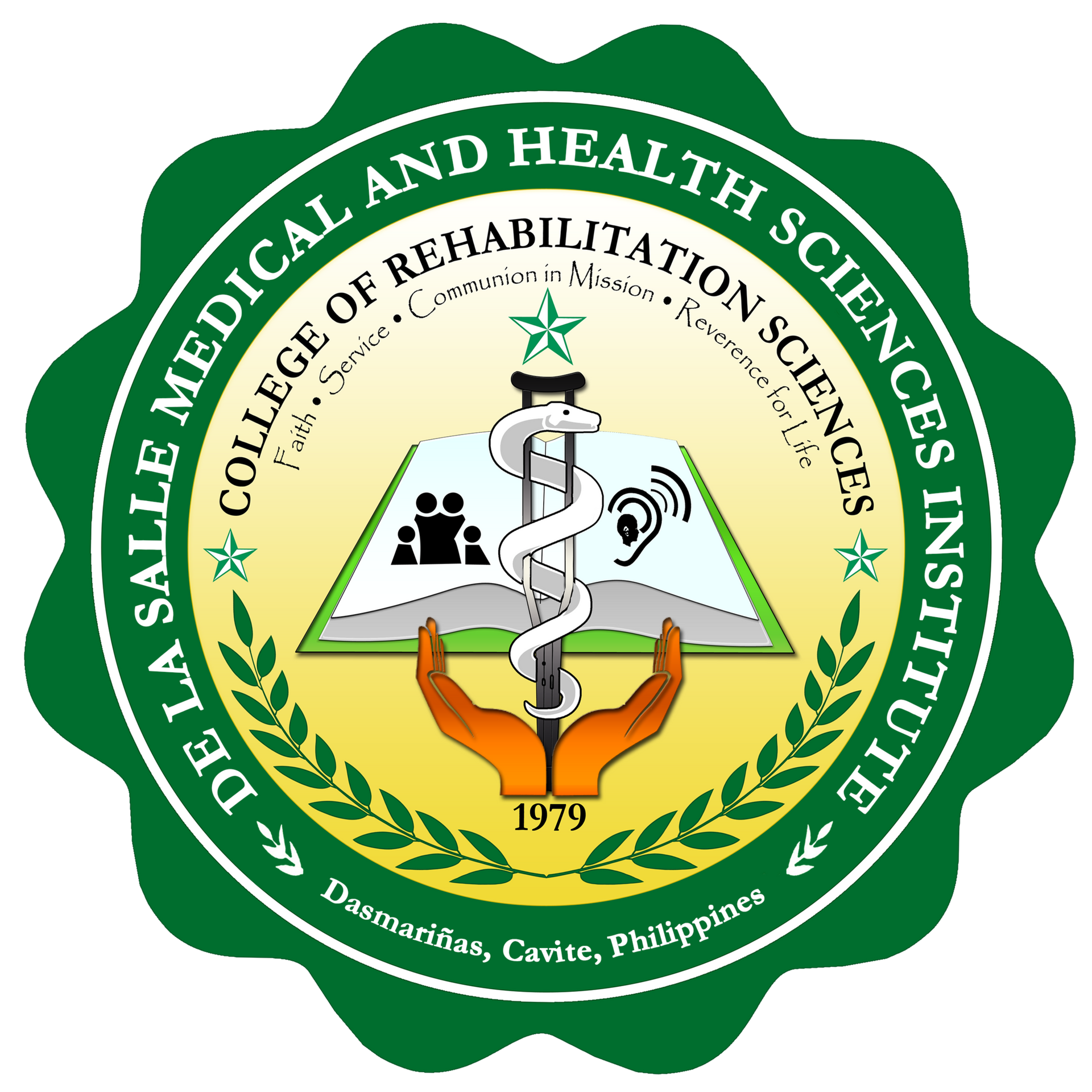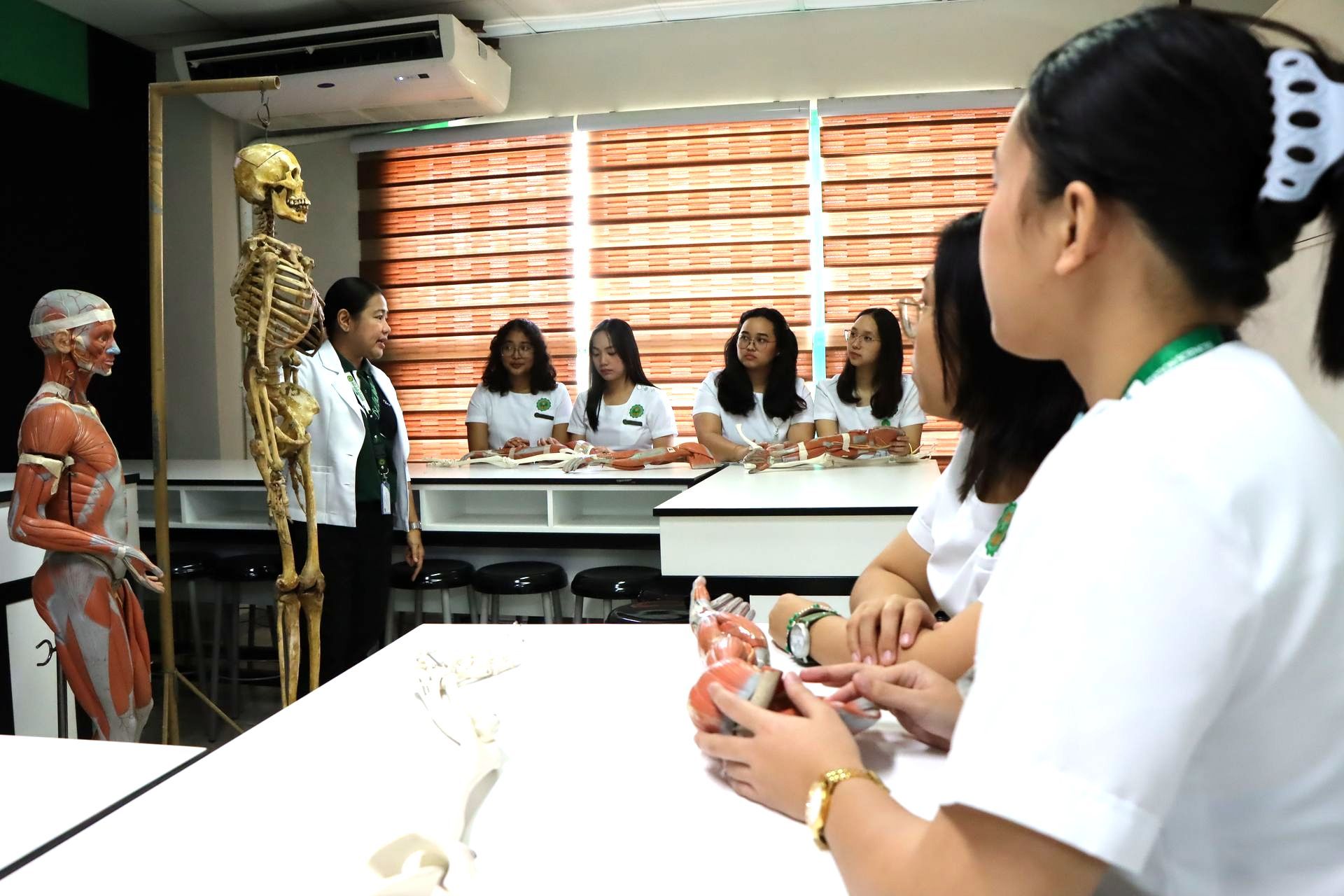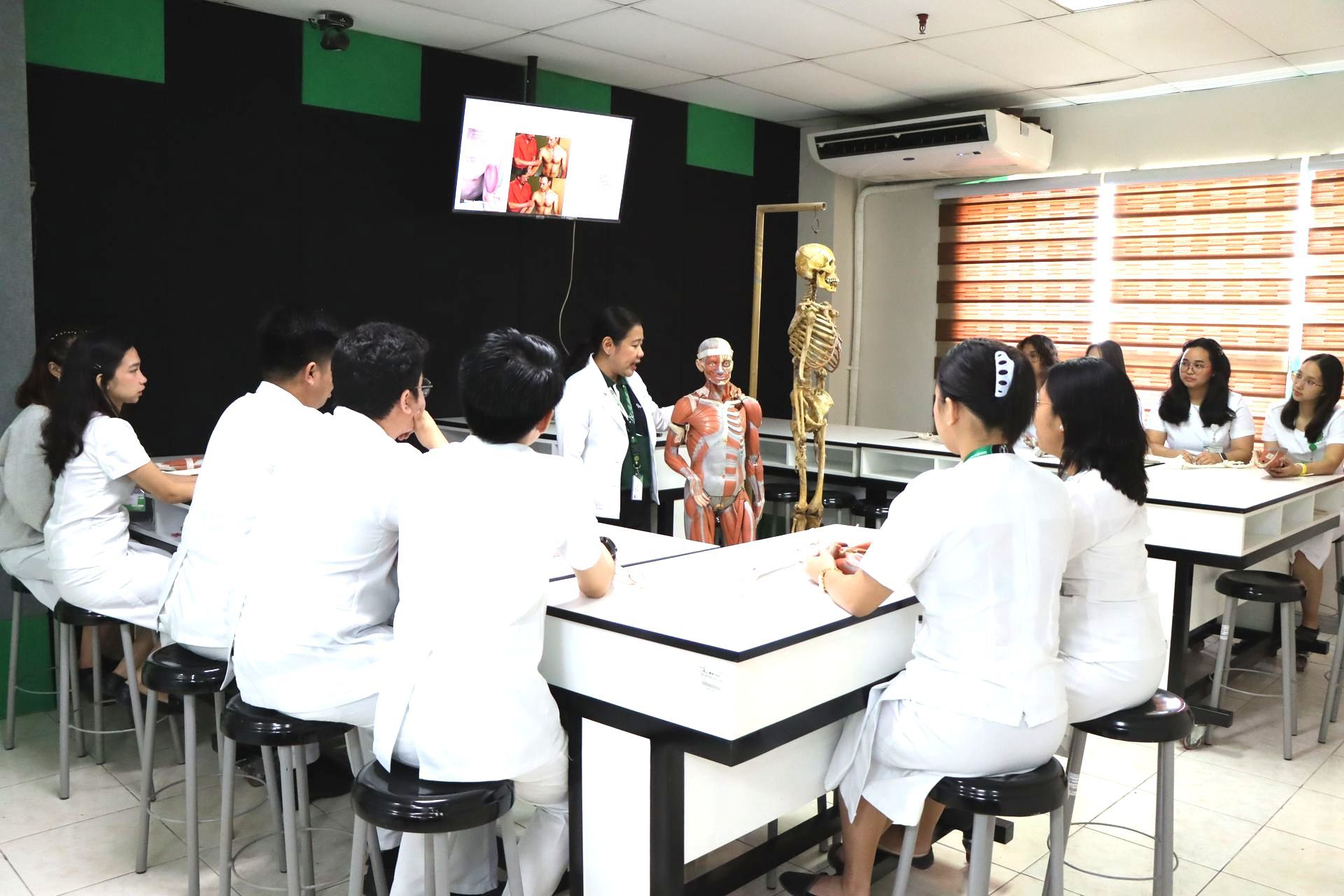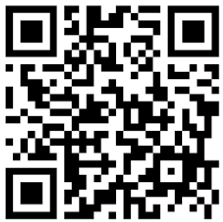

College of Rehabilitation Sciences
The College of Rehabilitation Sciences is one of the eight (8) colleges of DLSMHSI, the prime tertiary level institution in CALABARZON area of the Philippines, offering the BS Physical Therapy (PT), BS Occupational Therapy (OT), and BS Speech-Language Pathology (SLP) undergraduate programs, and is also one of the two (2) accredited institutions in the Philippines, other than UP Manila, to offer the PT/OT Refresher Program for graduates who failed the licensure examination for three consecutive times. It is the pioneering College in the Philippines to offer an integrated approach to its professional-level curriculum in the 3rd and 4th PT/OT/SLP proper years.
Medical Center
Nurturing Your Health
Academics
Nurturing Potentials
Research
Nurturing Discoveries
Lasallian Mission
Living the Mission
Medical Center
Nurturing Your Health
Academics
Nurturing Potentials
Research
Nurturing Discoveries
Lasallian Mission
Living the Mission
Medical Center
Nurturing Your Health
Academics
Nurturing Potentials
Research
Nurturing Discoveries
Lasallian Mission
Living the Mission
Nurturing Your Health
Academics
Nurturing Potentials
Research
Nurturing Discoveries
Lasallian Mission
Living the Mission
Medical Center
Nurturing Your Health
Academics
Nurturing Potentials
Research
Nurturing Discoveries
Lasallian Mission
Living the Mission
ABOUT US


Objectives
The College of Rehabilitation Sciences aims to:
- Offer alternative and innovative approaches in the delivery of the curriculum for the BS PT/OT/SLP programs;
- Conduct community outreach activities promoting participation and involvement of the CRS family;
- Establish linkages with local and/or national government and non-government organizations for the promotion and delivery of community service especially for Filipinos with disabilities;
- Offer scholarship programs for the poor but deserving students in the public high schools of Cavite;
- Offer certification programs that can help realize the health service potential and uplift the standards of living of the poor but deserving students in the community who cannot afford formal college education;
- Attain local and international accreditation for the programs offered;
- Establish local and international linkages that shall strengthen research collaboration, faculty, and student development or program development in the field of rehabilitation sciences; and
- Promote the enculturation of the expected Lasallian attributes to all members of the CRS family.
DLSMHSI CRS strongly advocates for the empowerment and improved quality of life of persons with disabilities, particularly children, and integrates this principle into its student and faculty development programs. It fosters a commitment to community service among its academic members as an integral part of education and training, aiming to assist Philippine society in addressing the gap between the required rehabilitation services at the community level and the delivery of quality care and consultation by qualified professionals in rehabilitation services (e.g., Physiatrists, Physical Therapists, Occupational Therapists, and Speech and Language Pathologists).
It is the pioneering College that established the first Early Intervention Outreach Facility in the Philippines (DJPRES, 2014) for Children with Disabilities. This facility operates on a partnership model between a tertiary education institution (DLSMHSI) and a public elementary school, collaborating to bridge the gap in rehabilitation services for economically disadvantaged children with disabilities in the Philippines. It also extends its service to the community by providing free wheelchair assessment and prescriptions to indigent members of the community. Through the sponsorship of Latter-Day Saints Charities (LDSC), free wheelchairs are distributed. The college takes pride in its faculty members, with four out of five holding Advanced Wheelchair Specialist certification in the country, and nearly all faculty members possessing intermediate and basic certification as wheelchair clinicians.
PROGRAMS OFFERED
BACHELOR OF SCIENCE IN
SPEECH-LANGUAGE PATHOLOGY
Professional speech pathologists promote the effective functioning of speech, hearing, and language mechanisms in individuals by properly evaluating, identifying, managing, and preventing speech, language, voice, fluency, cognitive, and other related communication disorders, as well as feeding and swallowing problems
BACHELOR OF SCIENCE IN PHYSICAL THERAPY
Physical therapy provides services to individuals and populations aimed at developing, maintaining, and restoring maximum movement and functional ability throughout life. This includes providing services in situations where movement and function are compromised by aging, injury, disease, or environmental factors. Functional movement is integral to overall health.
BACHELOR OF SCIENCE IN OCCUPATIONAL THERAPY
Occupational therapy is a client-centered health profession concerned with promoting health and well-being through occupation. The primary goal of occupational therapy is to enable people to participate in the activities of everyday life.
BACHELOR OF SCIENCE IN PHYSICAL THERAPY
Physical therapy provides services to individuals and populations aimed at developing, maintaining, and restoring maximum movement and functional ability throughout life. This includes providing services in situations where movement and function are compromised by aging, injury, disease, or environmental factors. Functional movement is integral to overall health.
BACHELOR OF SCIENCE IN OCCUPATIONAL THERAPY
Occupational therapy is a client-centered health profession concerned with promoting health and well-being through occupation. The primary goal of occupational therapy is to enable people to participate in the activities of everyday life.
BACHELOR OF SCIENCE IN
SPEECH-LANGUAGE PATHOLOGY
Professional speech pathologists promote the effective functioning of speech, hearing, and language mechanisms in individuals by properly evaluating, identifying, managing, and preventing speech, language, voice, fluency, cognitive, and other related communication disorders, as well as feeding and swallowing problems
Bachelor of Science in Physical Therapy
Physical therapy is a healthcare profession dedicated to enhancing movement, mobility, and overall quality of life for individuals across all ages. It plays a crucial role in developing, maintaining, and restoring optimal functional ability, particularly when movement is affected by aging, injury, disease, or environmental factors. Functional movement is fundamental to overall health and well-being, making physical therapy an essential component of healthcare.
This program is designed to identify and optimize movement potential and quality of life through health promotion, prevention, treatment/intervention, habilitation, and rehabilitation. It encompasses not only physical aspects but also psychological, emotional, and social well-being.
Physical therapy practice involves collaboration between physical therapists, patients/clients, other healthcare professionals, families, caregivers, and communities. It includes assessing movement potential, setting patient-centered goals, and applying specialized knowledge and skills unique to the profession to facilitate recovery and enhance function.
Physical therapy is a healthcare profession dedicated to enhancing movement, mobility, and overall quality of life for individuals across all ages. It plays a crucial role in developing, maintaining, and restoring optimal functional ability, particularly when movement is affected by aging, injury, disease, or environmental factors. Functional movement is fundamental to overall health and well-being, making physical therapy an essential component of healthcare.
This program is designed to identify and optimize movement potential and quality of life through health promotion, prevention, treatment/intervention, habilitation, and rehabilitation. It encompasses not only physical aspects but also psychological, emotional, and social well-being.
Physical therapy practice involves collaboration between physical therapists, patients/clients, other healthcare professionals, families, caregivers, and communities. It includes assessing movement potential, setting patient-centered goals, and applying specialized knowledge and skills unique to the profession to facilitate recovery and enhance function.
-
CORE SUBJECTS
- Clinical Anatomy, Kinesiology, and Biomechanics
- Clinical Neuro and Organ System Anatomy and Physiology
- Diagnostic Imaging in Physical Therapy
- Human Growth and Development
- Introduction to Medical Rehabilitation, Patient Care, Safety and Emergency Management
- Introduction to Research and Evidence-Based Practice
- Medical and Surgical Conditions
- Orthopedic, Rheumatologic, Industrial, and Sports Rehabilitation
- Integumentary, Metabolic, Cardiopulmonary and Geriatric Rehabilitation
- Pediatric and Adult Neurologic Rehabilitation
- Orthotics and Prosthetics
- Physical Therapy Examination, Evaluation, and Documentation
- Physical Agents and Modalities
- Adaptive-Assistive Orthotic and Prosthetic Applications
- Therapeutic Exercises
-
CAREER OPPORTUNITIES
Clinical Settings
- Clinical Physical Therapy
- Outpatient Physical Therapy
- Pediatric Physical Therapy
- Geriatric Physical Therapy
- Orthopedic Physical Therapy
- Cardiopulmonary Physical Therapy
- Neurological Physical Therapy
- Home Health Physical Therapy
- Aquatic Physical Therapy
Other Specialized Fields
- Sports physical therapy
- Industrial physical therapy
- Military physical therapy
- Community-based physical therapy
- Telehealth physical therapy
- Academe and Research
- PT Entrepreneur
Specialized Fields
- Sports physical therapy
- Industrial physical therapy
- Military physical therapy
- Telehealth physical therapy
Other Opportunities
- Academe and Research
- Community-based physical therapy
Bachelor of Science in Occupational Therapy
Occupational therapy is a client-centered health profession concerned with promoting health and well-being through occupation. The primary goal of occupational therapy is to enable people to participate in the activities of everyday life. Occupational therapists achieve this outcome by working with people and communities to enhance their ability to engage in the occupations they want to, need to, or are expected to do, or by modifying the occupation or the environment to better support their occupational engagement. – World Federation of Occupational Therapists (WFOT)
Occupational therapists help patients improve their ability to perform tasks in living and working environments. They work with individuals who suffer from a mentally, physically, developmentally, or emotionally disabling condition. Occupational therapists use treatments to develop, recover, or maintain the daily living and work skills of their patients. The therapist helps clients not only to improve their basic motor functions and reasoning abilities but also to compensate for permanent loss of function. The goal is to help clients have independent, productive, and satisfying lives.
-
PROGRAM OVERVIEW
Occupational therapy is a client-centered health profession concerned with promoting health and well-being through occupation. The primary goal of occupational therapy is to enable people to participate in the activities of everyday life. Occupational therapists achieve this outcome by working with people and communities to enhance their ability to engage in the occupations they want to, need to, or are expected to do, or by modifying the occupation or the environment to better support their occupational engagement. – World Federation of Occupational Therapists (WFOT)
Occupational therapists help patients improve their ability to perform tasks in living and working environments. They work with individuals who suffer from a mentally, physically, developmentally, or emotionally disabling condition. Occupational therapists use treatments to develop, recover, or maintain the daily living and work skills of their patients. The therapist helps clients not only to improve their basic motor functions and reasoning abilities but also to compensate for permanent loss of function. The goal is to help clients have independent, productive, and satisfying lives.
-
CORE SUBJECTS
- Clinical Anatomy, Kinesiology, and Biomechanics
- Clinical Neuro and Organ System Anatomy and Physiology
- Human Growth and Development
- Therapeutic Skills in Human Development
- Introduction to Occupational Therapy
- Theoretical Foundations in Occupational Therapy
- OT Evaluation, Assessment and Documentation: Physical Dysfunctions, Pediatric and Mental Health Conditions
- OT Management: Physical Dysfunctions, Pediatric and Mental Health Conditions
- Universal Design in OT
- Physical agents and Modalities
- Adaptive-Assistive-Orthotic and Prosthetic Applications
- Medical and Surgical Conditions
-
CAREER OPPORTUNITIES
1. Clinical Settings
- Clinical Occupational Therapy
- Pediatric Occupational Therapy
- Geriatric Occupational Therapy
- Mental Health Occupational Therapy
- Home Health Occupational Therapy
2. Community-based Rehabilitation
3. School-based OT
4. Work Rehabilitation
5. Academe and Research
Bachelor of Science in Speech-Language Pathology
Professional speech-language pathologists (SLPs) promote the effective functioning of communication and swallowing mechanisms in individuals by screening, evaluating, identifying, managing, and preventing speech, language, voice, fluency, cognitive, and other related communication disorders, as well as feeding and swallowing problems. Common cases managed by SLPs include fluency disorders (stuttering), articulation problems, voice disorders, language problems such as aphasia and language delay, and dysphagia (swallowing difficulties).
-
CORE SUBJECTS
- Acquired Language and Cognitive Conditions
- Anatomy and Physiology for Speech and Language Pathology
- Articulation and Phonology
- Augmentative Alternative Communication
- Aural Habilitation and Rehabilitation
- Community Health and Evaluation
- Conditions Associated with Speech and Language Disorders in Adults
- Conditions Associated with Speech and Language Disorders in Children
- Counseling in Speech and Language Pathology
- Dysphagia
- Ethics in Speech and Language Pathology
- Fluency
- Introduction to Audiology
- Introduction to Speech and Language Diagnostic Process
- Introduction to Speech and Language Intervention Process
- Language Development from Infancy to School Age
- Language Conditions in Children
- Language Processing and Cognitive Sciences
- Motor Speech Conditions
- Neuroanatomy and Physiology for Speech and Language Pathology
- Organization and Administration for Speech and Language Pathology
- Personal Effectiveness and Mentoring
- Principles and Foundations of Community-Based Rehabilitation Practice
- Professional Communication and Development
- Research Methods in Speech Pathology
- Research 2: Final Research and Defense
- Speech and Hearing Sciences
- Teaching and Learning
- Voice Disorders
-
CAREER OPPORTUNITIES
- Clinics (private pediatric clinics)
- Hospitals (in-patient and out-patient rehabilitation)
- Special Education (SpEd) and mainstream schools (primary and secondary education)
- Academe (tertiary education)
- Home-based care
- Tele-rehabilitation
- Community-based rehabilitation
- Research centers
ADMINISTRATORS
College of Rehabilitation Sciences
SY 2025 - 2026
| POSITION | NAME |
|---|---|
| Dean | Ma. Cecilia D. Licuan, PTRP, LPT, PhD |
| Vice Dean | Ken Kristoffer A. Tort , RSLP |
| Program Director, Department of Physical Therapy | Natalizia G. Pagtakhan, PTRP, MAE, DPT |
| Chair, Year Level 1, Department of Physical Therapy | Anna Dominique T. Castro, PTRP |
| Chair, Year Level 2, Department of Physical Therapy | Marilei L. Martinez, PTRP |
| Chair, Year Level 3, Department of Physical Therapy | Marivic D. Valerio, PTRP, MDE |
| Chair, Year Level 4, Department of Physical Therapy | Vivian M. Vizcarra, PTRP, DIH, CWAT |
| Program Director, Department of Occupational Therapy | Maria Luisa S. Valenzuela, OTRP, CWAT, MAESpEd |
| Chair, Year Level 1, Department of Occupational Therapy | Antonio I. Lubigan II, OTRP |
| Chair, Year Level 2, Department of Occupational Therapy | Michael L. Balabat, OTRP |
| Chair, Year Level 3, Department of Occupational Therapy | Louise Odeth L. Lanuza, OTRP, MASpEd, PhD |
| Chair, Year Level 4, Department of Occupational Therapy | Bernard John M. Red, OTRP |
| Program Director, Department of Speech-Language Pathology | Kerwyn Jim C. Chan, RSLP, MSc |
| Chair, Year Level 1, Department of Speech-Language Pathology | Miguel Don S. Baluyut, RSLP |
| Chair, Year Level 2, Department of Speech-Language Pathology | Marc Andrel S. Tanawan, RSLP |
| Chair, Year Level 3, Department of Speech-Language Pathology | Kim Angelica G. Santillan, RSLP |
| Chair, Year Level 4, Department of Speech-Language Pathology | Carmela Marie A. Carandang , RSLP |
| Chair, Research and Development | Jeanelle Louise D. Atienza, PTRP, MSPT |
| Chair, Learning Enrichment, Academic and Professional Success | Mary Angelica V. Legaspi, PTRP |
related links
related links
Contact Us
COLLEGE OF REHABILITATION SCIENCES
5th floor, Wang Building
De La Salle Medical and Health Sciences Institute
CLIENT FEEDBACK

Scan the QR Code or click here
LIKE AND SUBSCRIBE
Facebook Page: De La Salle HSI College of Rehabilitation Sciences
Twitter Account: @DLSHSICRS
Youtube: DLSHSICRS
CLIENT FEEDBACK

Scan the QR Code or click here
PHONE
Trunklines:
+63 (2) 8988-3100 (Manila) or
+63 (46) 481-8000 (Cavite)
Local nos.:
8049 (Telefax)
5004 (Administration)
1482 (Press Relations Staff)
1481 (Department of Physical Therapy)
1483 (Department of Occupational Therapy)
1110 (Department of Speech and Language Pathology)
1324 (Special Programs Unit)
ADDRESS
Governor D. Mangubat Avenue, Zone IV, City of Dasmariñas, Cavite, Philippines
CLIENT FEEDBACK

Scan the QR Code or click here
LIKE AND SUBSCRIBE
Facebook Page: De La Salle HSI College of Rehabilitation Sciences
Twitter Account: @DLSHSICRS
Youtube: DLSHSICRS
CLIENT FEEDBACK

Scan the QR Code or click here
ADDRESS
Governor D. Mangubat Avenue, Zone IV, City of Dasmariñas, Cavite, Philippines
PHONE
Trunklines:
+63 (2) 8988-3100 (Manila) or
+63 (46) 481-8000 (Cavite)
Local nos.:
8049 (Telefax)
5004 (Administration)
1482 (Press Relations Staff)
1481 (Department of Physical Therapy)
1483 (Department of Occupational Therapy)
1110 (Department of Speech and Language Pathology)
1324 (Special Programs Unit)

